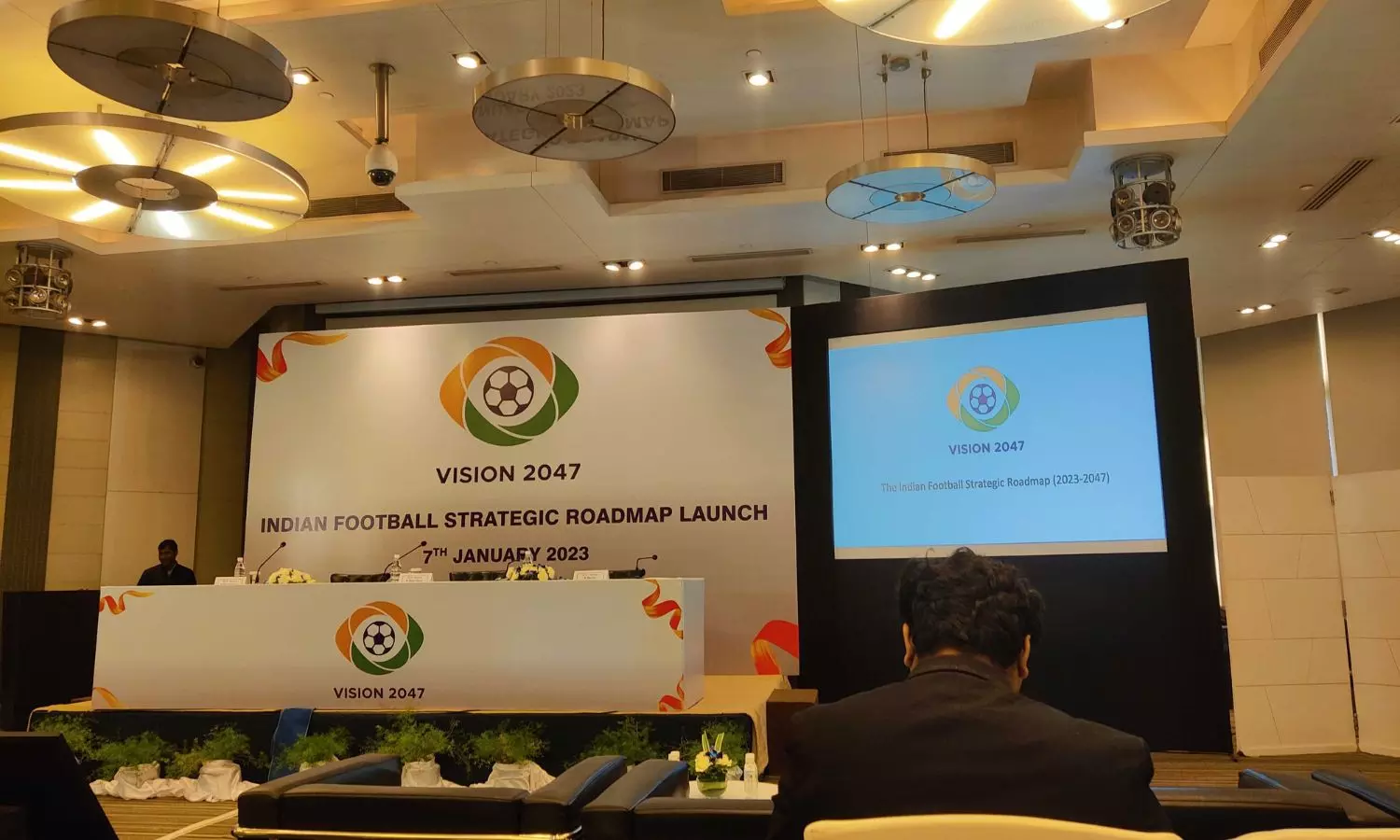Football
AIFF reveals 'Strategic Roadmap'; unveils 'Vision 2047'
11 core areas of focus were discussed at length by AIFF President Kalyan Chaubey and Secretary Shaji Prabhakaran.

AIFF revealed its Strategic Roadmap Vision 2047 (Photo by: PritishRaj/TheBridge)
New Delhi: The All India Football Federation (AIFF) announced its 'Strategic Roadmap', which is touted to take Indian football to greater heights, here on Saturday.
The duo of Kalyan Chaubey (President) and Shaji Prabhakaran (General Secretary) revealed 'Vision 2047', a 25-year plan with the intention to make the country a footballing hub by then.
In an event which spanned more than an hour, Chaubey and Prabhakaran explained in length each of the 11 core areas of focus which are the main points of contention in AIFF's 94-slide document, which has the nitty-gritty of the roadmap itself.
Here, The Bridge takes a brief look at the key aspects spoken about at this reveal:
Why 2047?
The year 2047 will mark the 100th year of India's Independence. The target is that by then, India would become a footballing powerhouse in Asia and the world. This is where the AIFF aims to take Indian Football by 2047:
- Among the top 4 in Asia
- Top 3 football leagues across genders
- One iconic player with international stardom in both men's and women's football
11 Areas of Focus in the Roadmap
Governance: Firstly, the duo stressed a lot about how the governing must be improved across all sectors. The introduction of a business unit, more focus on state associations, separate women's football department were some of the many goals discussed.
Infrastructure: AIFF aims to build two FIFA standard stadiums by 2026, and 30 by 2047. Moreover, another long-term goal includes the completion of a minimum of 50 football pitches per district. The plans also include a Women's National Centre of Excellence by 2026.
Clubs: Currently, the Indian football ecosystem has around 4,500 competitive clubs. The AIFF aims to increase this number to 20,000 by 2047. Moreover, it hopes to have at least 20 standalone women's teams, which focus on solely the development of women's football in the country.
Grassroots: From having 1 million registered players by 2026 to having a robust structure from village to national level by 2047, were some of the points talked about under the grassroots umbrella.
Talent Identification: Data would play a huge role in helping the federation and the clubs to identify true talent across the country. Additionally, the AIFF hopes to have 5000 licensed scouts by 2026.
Competitions: "Competitions is our weakest link and we need to improve," said AIFF Gen Sec Prabhakaran. Hence, the rebranding of the Santosh Trophy, more focus on e-football, futsal, and beach soccer, and the revival of the Gold Cup and the Intercontinental Cup were some of the talking points.
Marketing & Commercialisation: Two of the main goals as per the Roadmap include increasing AIFF's revenue by 500% till 2026 and launching three television properties by the same year to further help funds.
Digital Transformation: The Secretary-General mentioned that similar to FIFA+, India and AIFF will come up with something similar so that it can contribute to the world of football digitally as well.
Refereeing: On 10th January, a formal announcement will be made which reveals AIFF's intention to sign professional referees. By 2047, the main aim is to have Indian officials officiating at the highest level of football regularly.
Coach Education: Currently, there are only 8,723 football coaches in the country. By 2026, the roadmap aims to have 50,000 active coaches before increasing it to 350k in 2047.
National Teams: For the Men's team, the goal is to be amongst the Top 10 in Asia by 2026 and Top 7 by 2036. For the Women's team, the aim is to be top 8 by 2026 and qualify for the upcoming U-17 FIFA World Cups in the coming years.
"We have to exhibit the commitment to work and develop our ecosystem to achieve these goals we have set for ourselves. We have already witnessed it in other sports and we need to learn from them and put all of it into practice. We have to make our football model sustainable and commercially successful," concluded Shaji Prabhakaran, General Secretary of All India Football Federation (AIFF).
